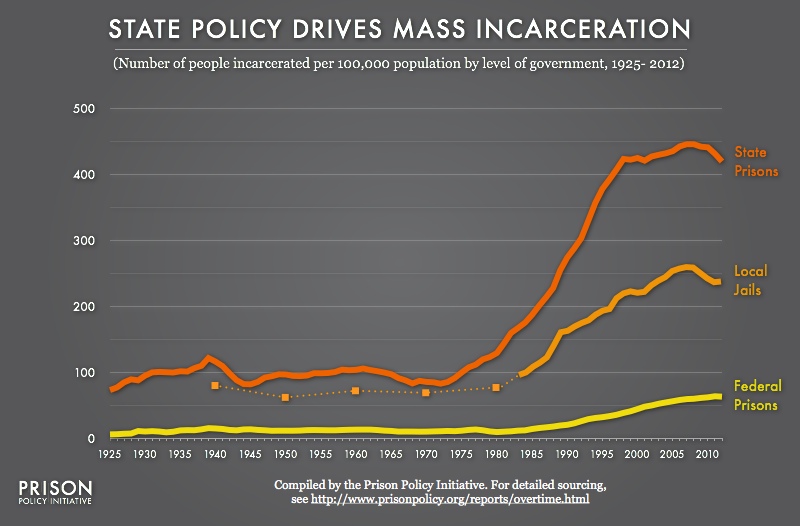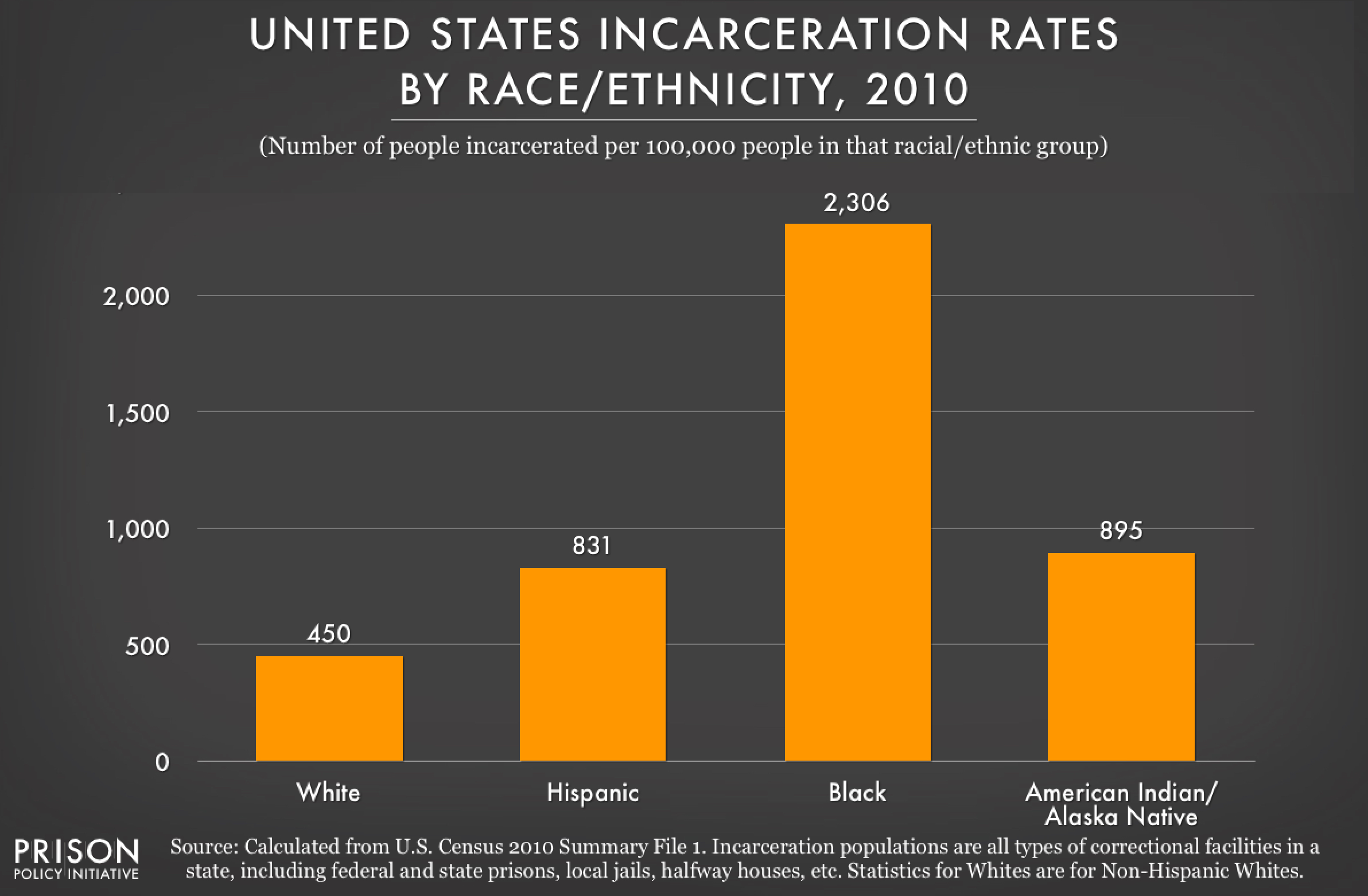Our newest staffer comes to us from the University of California, Berkeley, and has previously worked with National Council on Crime and Delinquency, Voice of the Ex-Offender, and Californians United for Responsible Budget.
by Peter Wagner,
May 30, 2014
 Please welcome our new Policy & Communications Associate, Bernadette Rabuy.
Please welcome our new Policy & Communications Associate, Bernadette Rabuy.
Bernadette comes to us from the University of California, Berkeley, and has previously worked with National Council on Crime and Delinquency, Voice of the Ex-Offender, and Californians United for a Responsible Budget.
Bernadette starts August 1st.
Supreme Court struck down Florida decision that Freddie Lee Hall was eligible for execution with an IQ score of 71, above the cutoff of disability at 70.
by Bernadette Rabuy,
May 28, 2014
On Tuesday, May 27, 2014, the United States Supreme Court struck down Florida’s strict use of an I.Q. cutoff as a legitimate way to decide which mentally disabled individuals must be spared from the death penalty. In a 5-to-4 decision, the Supreme Court ruled that Florida was in violation of the Eighth Amendment’s prohibition of cruel and unusual punishment.
In a 2002 Supreme Court case, Atkins v. Virginia, the Supreme Court gave states general guidelines for determining intellectual disability: low I.Q. scores, a lack of fundamental social and practical skills, and the presence of both conditions before age 18. Furthermore, while the Supreme Court left the specific qualifications to the states, it did assert that I.Q. scores under approximately 70 typically indicate disability.
On Tuesday, the Supreme Court further curbed the use of the death penalty. While in a 2012 decision the Florida Supreme Court ruled that Mr. Freddie Lee Hall was eligible to be executed since he had been measured with I.Q. scores of 71, 73, and 80, on Tuesday Justice Kennedy disagreed with the Florida Supreme Court arguing that intellectual disability should not be boiled down to a rigid number and should be understood as a more complex condition. As Hofstra law professor Eric M. Freedman states, “death row inmates commonly suffer from multidimensional mental problems.” This ruling will affect other states with similar cutoffs, such as Kentucky, Virginia, and Alabama.
Tuesday’s Supreme Court decision is reflective of recent discussions to further limit the use of the death penalty, which Justice Kennedy called the “gravest sentence our society may impose.” A recent study by Samuel Gross, a law professor at the University of Michigan Law School, found that more than 4% of all defendants who have been sentenced to death are likely innocent. Gross explains that while the number of innocent people who have been executed is fairly low, it is more common for innocent defendants to be sentenced to prison for life and be forgotten. This issue is exacerbated by the fact that prisoners who are awaiting execution on death row receive more intense scrutiny than prisoners whose sentences are reduced to life in prison. As there is further examination of the death penalty, it is important to additionally examine those serving life sentences, especially since one of every nine state prisoners is serving a life sentence.
Even though Justice Kennedy wrote that Mr. Freddie Lee Hall may or may not be intellectually disabled, Mr. Hall will have the opportunity to present evidence of his intellectual disability and receive a new assessment by the lower courts. Careful examination of the death penalty and life in prison are essential in order to maintain, what Justice Kennedy called, “our nation’s commitment to dignity.”
316 graphs of state-by-state data on racial disparities and prison growth
by Peter Wagner and Leah Sakala,
May 28, 2014
Today, the Prison Policy Initiative released two new briefings and a brand new way to access useful data about incarceration in your state.
We released:
Also today, we launched 50 state profiles (and a national one) giving you one-click access both to the findings of these two new briefings and to the highlights of all of our work over the last 13 years on each state:
All told, we produced 316 new graphs for you to use, including these two never-seen-before graphs from the U.S. profile page:


As we explain on our national profile page,
With over two million people behind bars at any given time, the United States has the highest incarceration rate of any country in the world.
We spend about $82.4 billion every year — not to mention the significant social cost — to lock up nearly 1% of our adult population. To be able to evaluate this policy choice, our communities must have access to reliable and up-to-date information about the trajectory and scope of our nation's experiment with mass incarceration. With this page, and the accompanying 50 State Incarceration Profile series, we hope bring some of the most important and under-discussed national facts into the public discourse.
Data show that the U.S’s incarceration tab in 2010 came out to a whopping $82.4 billion. Which is actually a serious underestimate.
by Leah Sakala,
May 23, 2014
While working on an upcoming report, I set out to find the answer to a relatively straightforward question: What is the direct fiscal cost of incarceration in the United States?
The answer, it turns out, was not readily available. So I started to pull some sources. Here’s what I found for correctional expenses in 2010:
This means that the U.S.’s incarceration tab in 2010 came out to a whopping $82.4 billion.
That’s a lot of money, but it’s also a significant underestimate for two important reasons:
- This figure does not include expenses related to law enforcement, courts, or other pieces of the mass incarceration pie, such as the immigration detention system.
- This figure also does not include the huge and unquantifiable social price of overcriminalization, which falls on the shoulders of families, communities, and future generations.
Governor extends ban on draconian restraints to all state and local correctional facilities.
by Joe Mirkin,
May 21, 2014
Thanks for stopping by this morning and guest-blogging, Joe! -PPI
Last week, Governor Deval Patrick signed an anti-shackling bill into law, making Massachusetts the 21st state to abolish the harmful and brutal practice of restraining incarcerated women who are pregnant, in labor, or in the post partum period.
(Read the Governor’s press release here)
The bill, S.2063, “An Act to Prevent Shackling and Promote Safe Pregnancies for Female Inmates, “also takes great strides towards establishing a “minimum level of care that must be afforded to pregnant inmates in county correctional facilities.”
While previous anti-shackling rules only applied to state prisons, the new law covers all corrections facilities in Massachusetts.
We strongly agree with Marianne Bullock, of the Prison Birth Project, when she said, “The next step is ensuring that this law is enforced.” We will continue, alongside fellow members of the Massachusetts Anti-Shackling Coalition, to advocate against any continuation of the practice following the passage of this law.
Our thanks and congratulations go out to all coalition members!
Members of the Massachusetts Anti-Shackling Coalition Include:
ACLU of Massachusetts, American Friends Service Committee of Western MA, Black and Pink, Boston Area Rape Crisis Center, Boston Feminists for Liberation, Casa Myrna, Civil Liberties and Public Policy, Coalition for Effective Public Safety, Dismas House—Worcester, Families for Justice as Healing, Harvard Prison Legal Assistance Project, Health Care for All, Health Law Advocates, Hollaback! Boston, Jane Doe Inc—the MA Coalition Against Sexual Assault and Domestic Violence, Jewish Alliance on Law and Social Action, JRI Health, The Law Offices of Howard Friedman, The Massachusetts Chapter of the National Organization for Women, Mount Holyoke Students Against Mass Incarceration, NARAL Pro-Choice Massachusetts, National Lawyers Guild, Massachusetts Chapter, Out Now—Springfield, Planned Parenthood League of Massachusetts, Pretrial Working Group, Prison Birth Project, Prisoners’ Assistance Project at NUSL, Prisoners’ Legal Services, Prison Policy Initiative, Real Cost of Prisons Project, Religious Coalition for Reproductive Choice, Stern, Shapiro, Weissberg and Garin, LLP, And Still We Rise, Unitarian Universalist Urban Ministry, The Women’s Bar Association of Massachusetts, Worcester Homeless Action Committee.
This award "recognizes outstanding public interest lawyers whose work best exemplifies its namesake’s legacy of fearless, uncompromising and creative advocacy on behalf of marginalized people."
by Leah Sakala,
May 15, 2014
We are thrilled and honored to announce that our Executive Director, Peter Wagner, has been selected as the winner of the American Constitution Society’s 2014 David Carliner Public Interest Award. This award “recognizes outstanding public interest lawyers whose work best exemplifies its namesake’s legacy of fearless, uncompromising and creative advocacy on behalf of marginalized people.”
Peter will accept the award at the American Constitution Society’s 2014 National Convention next month in Washington D.C.
Press Release for report Suspending Common Sense in Massachusetts: Driver's license suspensions for drug offenses unrelated to driving
May 14, 2014
FOR IMMEDIATE RELEASE May 14, 2014
Contact:
Leah Sakala
(413) 527-0845
Easthampton, MA — Every year the state of Massachusetts needlessly suspends the driver’s licenses of thousands of the state’s residents, charges a new report by the Prison Policy Initiative. The report, Suspending Common Sense in Massachusetts: Driver’s license suspensions for drug offenses unrelated to driving, explains that a state law from the late 1980’s automatically suspends the driver’s licenses of anyone convicted of a drug offense, even if the offense had nothing to do with operating a vehicle or road safety.
“After more than two decades, the evidence is in. Using the Registry of Motor Vehicles to punish drug offenders is neither smart drug policy nor good for road safety”, said report author Leah Sakala, a policy analyst at the Easthampton-based non-profit Prison Policy Initiative.
The Massachusetts legislature is currently considering a bill, H3099/S1643, that would end the practice of suspending driver’s licenses for unrelated drug offenses.
“Mandating license suspensions for those facing drug possession charges not stemming from any involvement with a motor vehicle is ineffective and counterproductive,” said bill sponsor Representative Liz Malia. “We must move away from policy creating collateral consequences that form barriers to successful reentry and access to treatment and recovery.”
“Both at the state and federal level we are seeing an increasing embrace of not just being tough on crime, but smart on crime,” bill sponsor Senator Harriette Chandler stated. “Unduly burdening folks trying to turn their lives around with a license suspension and subsequent draconian reinstatement fee is not smart, and is in fact counterproductive.”
Mike Earielo, a volunteer with the Worcester community organizing group EPOCA, said, “We want people coming out of jail to change their ways, but then laws like this one make it nearly impossible for guys like me. I have a serious disability due to a cyst on my spine, and there’s no way I can come up with $1,500 to reinstate my driver’s license. Stop holding me back and watch what I can do!”
The Prison Policy Initiative report explains that both law enforcement officials and organizations such as the American Association of Motor Vehicle Administrators have publicly opposed the practice of suspending driver’s licenses for reasons unrelated to driving, pointing to the enormous fiscal and administrative burden associated with enforcement.
The report reviews the inefficacy of the current policy, tallies the unanticipated side effects, and calls for Massachusetts to join more than 33 other states in opting out of this shortsighted policy.
Ms. Sakala will present her findings at a legislative briefing in support of H3099/S1643, sponsored by Sen. Harriette Chandler Rep. Liz Malia, at the Massachusetts State House on Wednesday May 14 at 2:30 PM. The report, Suspending Common Sense in Massachusetts, will also be made available after the briefing at http://www.prisonpolicy.org/driving/.
-30-
This Mother's day, hundreds of thousands of kids won't be able to call their mothers, and if Mom calls them, those kids are going to have a hard time paying for the call if she calls them.
by Peter Wagner,
May 9, 2014
This Mother’s day, hundreds of thousands of kids won’t be able to call their mothers, and if Mom calls them, those kids are going to have a hard time paying for the call if she calls them. Incarcerated mothers — and most incarcerated women are parents of children — can’t receive phone calls but instead need to do the calling.
Who calls who wouldn’t be important if incarcerated moms could choose between an unlimited long distance plan and free Skype like most people do. Instead, incarcerated mothers have to use the monopoly vendor selected by their prison or jail; and the prison or jail generally selects the company that offers the highest kickback commission from the call.
You can see where this is going. The calls are expensive. The “good” news is that the Federal Communications Commission recently capped the maximum rate that can be charged for an interstate call at 21 or 25cents a minute. (Yes, people in prison live in a world where they might be lucky to make 25cents an hour from their job in the prison and where they celebrate the federal government lowering the cost of a call from $1/minute to 25cents.) But about 80% of kids with incarcerated parents won’t benefit from those new price caps because most calls home from prison are in-state calls not subject to the new price caps.
We need to work together to ensure that this is the last Mothers Day where families need to choose between putting food on the table and telling Mom how much she is missed and loved.
Sourcing: The Bureau of Justice Statistics report Parents in Prison and Their Minor Children is a goldmine of information about incarcerated parents and their minor children in state and federal prison, including detail about frequency of visits and other contact, that most they lived together with their kids when they were arrested, etc. Regarding the use of “hundreds of thousands” in this post, the BJS report says that in 2007, there were 131,000 minor children who had a mother in state prison, 16,400 who had a mother in state prison. Not included in that study were jails, which are an important but often overlooked 30% of the mass incarceration pie.
by Peter Wagner,
May 5, 2014
I was saddened to learn that my friend and colleague James Kilgore, a scholar and writer on race and justice issues, was the subject of a series of attack pieces focused on his decades-old criminal record from the 1970s. I was shocked, however, when shortly thereafter the University of Illinois suddenly refused to renew Mr. Kilgore’s contract as a lecturer in the Department of Global Studies despite his stellar performance reviews by faculty and students alike.
The University of Illinois was fully aware of Mr. Kilgore’s history during the hiring process, and has greatly benefited from Mr. Kilgore’s scholarship for more than three years. As a petition signed by more than 300 University of Illinois faculty members states, the decision to not renew Mr. Kilgore’s contract,
…represents a serious blow to academic freedom and employment equity. The University should not base employment decisions on outside political pressure. Furthermore, faculty and staff contracts should be renewed based on performance and programmatic needs, not on a person’s political or criminal background.
We submitted our own letter to Chancellor Phyllis Wise urging her to renew Mr. Kilgore’s contract. Please add your voice to the call by signing the petition on change.org.
More than 3,300 people have liked the graphic on Facebook and more than 1,100 people around the world have tweeted about the graphic on Twitter.
by Sadie Gold-Shapiro,
May 5, 2014
In preparation for this year’s Pi Day (3/14), Prison Policy Initiative released the report “Mass Incarceration: The Whole Pie,” which features a graphic that answers the question “How many people are locked up in the United States?” The response has been overwhelming; to date, more than 3,300 people have liked the graphic on Facebook and more than 1,100 people around the world have tweeted about it on Twitter.
The graphic is the first of its kind to compile data from multiple sources in order to give an accurate count of the current incarcerated population of the United States. As Sara Mayeux, creator of the Prison Law Blog, tweets:
Rebecca McCray, a criminal justice writer and former ACLU staff member tweets:
Continue reading →
 Please welcome our new Policy & Communications Associate, Bernadette Rabuy.
Please welcome our new Policy & Communications Associate, Bernadette Rabuy. Breaking Down Mass Incarceration in the 2010 Census:
Breaking Down Mass Incarceration in the 2010 Census:





